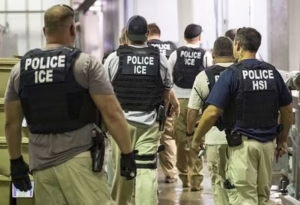A federal appeals court in Washington dealt a major setback to President Trump’s immigration strategy by maintaining the freeze on a policy that sought to extend “expedited” deportations well beyond the southern border to target migrants arrested anywhere in the United States.
On Saturday, November 22, a three-judge panel of the U.S. Court of Appeals for the District of Columbia rejected, by a two-to-one vote, the administration’s request to suspend a ruling issued on August 29 by federal Judge Jia Cobb. She had determined that the new policy violated constitutional due process guarantees for individuals who might be apprehended far from the border.
What the Trump Administration Wanted to Change
Since the late 1990s, the so-called “expedited removal” procedure has allowed the Department of Homeland Security (DHS) to quickly deport migrants intercepted in the immediate vicinity of the border, without a full hearing before an immigration judge. Until now, this mechanism was essentially limited to individuals arrested shortly after their entry into the country and within a defined border zone.
In January 2025, the White House decided to expand this procedure: any person without lawful status, arrested anywhere in the United States and unable to prove at least two years of continuous presence in the country, could be removed through this ultra-fast track. The measure closely mirrored a provision previously implemented by Donald Trump in 2019, then rescinded by the Biden administration.
Immigrant rights advocacy organizations, including the group Make the Road New York, challenged this new rule in federal court, denouncing a policy that “turns the entire territory into an expedited removal zone” and subjects long-established residents to the same summary procedures as migrants apprehended at the border.
Judge Cobb Sounds the Alarm
In her August 29 order, Judge Jia Cobb, a magistrate of the federal district court in Washington, ruled in favor of the plaintiffs. She prohibited DHS from implementing the expanded procedure, finding that the mechanisms established by the administration did not adequately protect these migrants’ fundamental rights, particularly the right to contest their deportation and to assert potential claims for protection.
According to the judge, the system designed by the government created a high risk of error: people living lawfully in the United States, or who could claim asylum, could be removed without any real opportunity to present their arguments or access an attorney. She therefore ordered DHS to return, at least temporarily, to the previous limits of expedited removal.
The Trump administration immediately appealed to the court of appeals in an attempt to obtain a suspension of this decision pending review of the case on its merits.
Appeals Court Upholds the Block
On Saturday, two judges appointed by Democratic presidents, Patricia Millett and J. Michelle Childs, refused to grant the White House’s request. In their opinion, they wrote that the government had not demonstrated that it had “implemented systems and procedures capable of ensuring effective respect for due process rights protected by the Fifth Amendment.” They emphasized the existence of “serious risks of erroneous summary deportations” if the expansion were to take effect across the entire U.S. territory.
In practical terms, the decision means that the policy freeze remains in place: migrants arrested far from the border cannot be placed in this fast track solely on the basis of a presumption of presence of less than two years, as long as the court has not decided the appeal on the merits, scheduled for December 9.
The appellate judges did, however, marginally soften the district court’s order: they suspended the portion that required immediate modifications to the procedures for assessing “credible fear” of persecution or torture, determining that this aspect fell under a different legal framework.
Judge Neomi Rao, appointed by Donald Trump, voted against the majority. In a dissenting opinion, she characterized Judge Cobb’s decision as “unacceptable judicial interference” in the executive’s immigration prerogatives.
Political and Human Stakes for Trump’s Immigration Policy
For the White House, the expansion of expedited removal constitutes one of the flagship tools of its hardline immigration policy: it would allow for faster and less expensive removal of undocumented individuals, without further overburdening already overloaded courts. DHS officials regularly defend this approach as a means of “restoring credibility” to the immigration system.
But for immigrant rights organizations, the appeals court decision confirms that the administration has gone too far. The plaintiffs hailed a “crucial victory for the rule of law,” noting that a mechanism originally designed for border apprehensions cannot be extended across the entire country without robust safeguards. In previous public statements, attorneys from groups such as the American Immigration Council and the ACLU had already denounced a policy that “permits mass deportations without hearings, without attorneys, and without genuine judicial oversight.”
Beyond the legal debate, the stakes are highly concrete for migrant communities, particularly Latin American, Caribbean, and African populations. Individuals established for several years but unable to quickly document their continuous presence—due to lack of formal employment contracts, leases in their names, or bank accounts—would risk being removed within days. For many human rights advocates, the appeals court decision offers respite to these vulnerable populations.
Next Step: A Substantive Battle Before the Judges
The Trump administration did not immediately respond to the Washington appeals court decision. According to Reuters, the case is scheduled to be argued on the merits on December 9, when judges will decide whether the expansion of expedited removals is compatible with the Constitution and federal immigration laws.
Whatever the outcome, this case is part of a series of judicial showdowns over President Trump’s immigration policy, from asylum restrictions to the use of emergency powers to accelerate removals. Each time, the courts emphasize that even in immigration matters, the executive branch must respect the fundamental guarantees enshrined in the U.S. Constitution.
Article based on Reuters dispatches, Newsmax coverage, and court documents from the U.S. Court of Appeals for the District of Columbia and the federal district court in Washington, D.C.
https://ctninfo.com/federal-court-bl…re-u-s-territory/
https://www.facebook.com/CaribbeanNewsMedia








